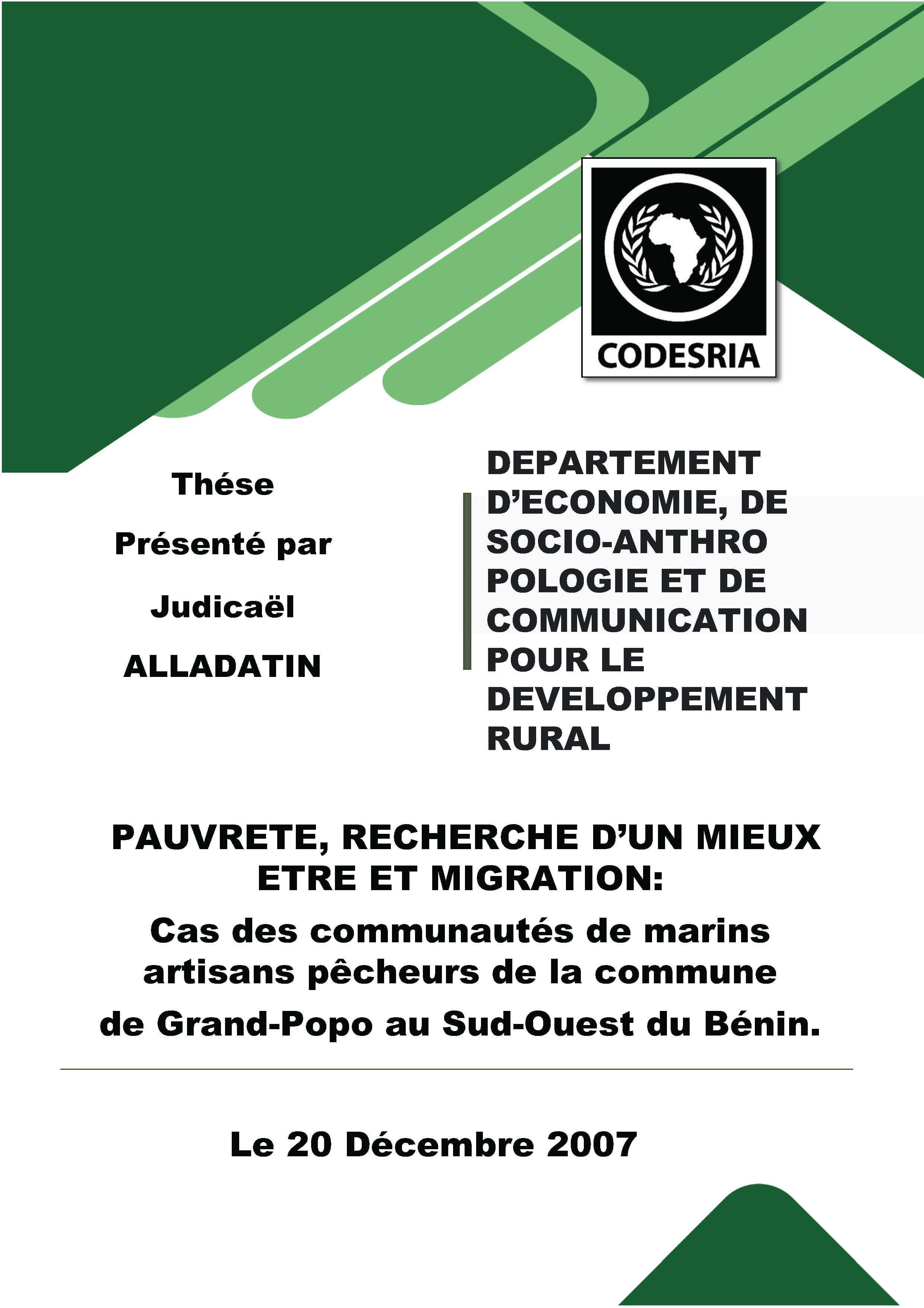PAUVRETE, RECHERCHE D’UN MIEUX ETRE ET MIGRATION: Cas des communautés de marins artisans pêcheurs de la commune de Grand-Popo au Sud-Ouest du Bénin.
Keywords:
POVERTY, SEARCH FOR A BETTER BEING, MIGRATION, seafaring communities, fishermanSynopsis
In most of the developing countries, especially in Benin, poverty remains and remains a subject of topicality. However, the general report on the situation of the fishing zones is degradation continues of living conditions; the income of the fishermen is reduced year by year accentuating their level of poverty. The most concerned fishermen are the sailors craftsmen like those of Grand-Popo (historically expert in fishing), because of the variability of marine ecology, the low availability of ground for agriculture, and of their quasi-total dependence of fishing. Under these conditions, the fishermen deploy various strategies of search for a greater comfort, for example, migration. The literature reveals the existence of many researches on the migrations of share the world. However, in the socio-economic plan the process and the determinants of the migration, the historical profile of the migrants, the interrelationships between the migration, poverty and the natural resources, the place of the migrations within the strategies of subsistence and their contributions to the reduction of poverty, just as the study of the net income of the migrations and, all this differentiated according to the relative level from wellbeing for the households remain current problems in Benin. The socio-economic organization of the fishermen can be to apprehend starting from
two types of institutions: community and the operating system. The socio-economic environment of artisanal maritime fishing conceals several constraints which exert their influence on the future even of fisheries sector like on the subsistence of the
fishermen. The migration is an integral and fundamental aspect fishing with Grand-Popo for various reasons (upwelling seasonal, absence of structures of technical trainings, material constraints, absence of the structures of financing, negative effects of the oil activity and absence of a policy of adjustment of the fishing zones). Migrations of fishermen of Grand-Popo must be registered within the more total framework of the fitting of the communities on the African western littoral and of central Africa, which also is to him the fruit many old and current migrations African and international. Generally, the period of migration is rhythm by the seasons of fishing. Socio-economic arrangements of the migrations relate to the type of decision (individual or collective) and the mode of financing of the migration (own capital stocks or prefinancing or mixed standard). Several reports have trickled our investigations and illustrate well the bonds between the relations of kind and the behaviours migratory. For example, the men are much more independent in the migration; they often only migrate while leaving their wife instead of origin. The analysis of the dendrogramm and the various classes of households realized at the
end of the "cluster analysis” enables us to note that there is a heterogeneity between the households with regard to the wellbeing. The first assumption of research is refuted: The medium of the fishermen is heterogenic in term of wellbeing. Four (4) categories of wellbeing, were then made up are: "Very poor ", "Poor ", "less poor ", "Non poor ". The results of the econometric analysis lead us to accept our assumption relating to the conditions of the household and its environment of life which would determine the choice of the fishermen as regards migration. Among the factors suspected of having an effect on the decision to migrate, the environment in which saw the household or its village of residence, the ratio of dependence in the household and the rate of schooling in the household, are those which have a significant effect. The analysis of the impact of the migration on the various capitals of the households take us along to conclude that fisher which migrate decrease the human capital, the social capital and naturalness capital of their household without contributing to the financial scheme; what puts in danger the efforts of subsistence of these households. The migration does not make it possible to improve the wellbeing of the households. There remains a strategy of diversification of risks for the households with its contribution to the
financial capital and the physical capital but also an individual strategy of improvement of the income for the migrant.






